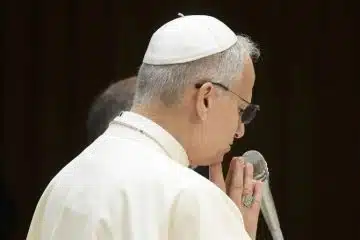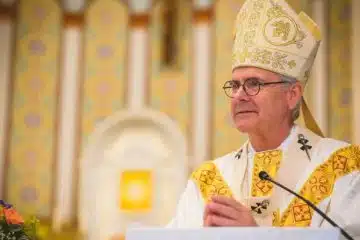The Catholic Moment: The spiritual benefits of fasting
Wednesday, March 11, 2009
By Father Kyle Schnippel
Why is it that a nice juicy hamburger always sounds better on Fridays of Lent than any other day? I can go weeks without craving this particularly American meal, but once Lent starts it seems that this is all I can think of! The forbidden fruit lures one into its trap.
During Lent we are called to a particular joy in fasting, as we hear on Ash Wednesday: “When you fast, do not put on a gloomy face like the hypocrites.” Rather, Jesus instructs us to “Wash our faces, and your Father who sees in secret will repay you.” (Matthew 6:17-18) So we are called to fast joyfully, but what are the roots of why we fast?
It actually starts at the very beginning of the Old Testament, as Adam is instructed in the Garden of Eden to eat freely of all the fruit that is present, except that of the Tree of Knowledge of Good and Evil. It is a divine command from God to help exercise our discipline in following His commands.
Fasting marks so many other aspects of life in the Scriptures as well. Whenever the people of Israel begin a journey, they are to fast so that they may rely on God’s strength, rather than their own, for the completion of the journey. Jesus begins His public ministry with a period of 40 days of fasting and prayer in the desert. His confrontation with Satan at the end of this time of purification gives us the answer to the spiritual dimension of fasting, as “one does not live by bread alone, but by every word that proceeds from the mouth of God!” (Matthew 4:4) Our discipline of fasting is to help our own purification process so that following in the example of Jesus we may do just what He instructs here.
These spiritual dimensions of fasting help to break the modern tendency to see the results in purely physical terms. It is good to lose weight, to have less of oneself to carry around, but these are only secondary effects of the deeper spiritual reality that is shared in fasting.
Fasting is not the only aspect of Lent. The “three-legged stool” also includes almsgiving and prayer. These are certainly informed by our fasting. Our experience of hunger, of thirsting for God’s presence while we fast, should also highlight the daily need of the poor among us.
Pope Benedict remarks in his Lenten message that “voluntary fasting enables us to grow in the spirit of the Good Samaritan, who bends low and goes to the help of his suffering brother.” We give of our surplus so that those in need may experience the providence of God.
Ideally, our program of fasting, prayer and almsgiving is not something that we do only during Lent, but is a mark of the life of a committed Catholic Christian. We focus on these in specific ways during this time so that we might strive to turn vices that have crept into our lives over the last year into virtues that help to build the Kingdom of God. So in fasting from sarcasm, for example, we should also try to build up a virtue of praising and extolling our neighbors.
Finally, fasting turns our hearts toward God. We are to recognize through our sacrifice that all that we truly need is God’s loving providence. He will provide for those who step out in faith. As we are freed from our dependence upon material goods, we can experience this providence on an ever deeper level. We come to a great communion with the God who loves us so much that He sent His only Son so that we might have life through Him.
During this time of Lent, let us strive to be unencumbered by the anxieties of this life, so that we might have freedom in the next.
For a family practice of Lent, go to http://cincinnativocations.org/vocationawarenessweek2009/Family%20Faith%20Formation.pdf
Father Schnippel is director of the Vocation Office of the Archdiocese of Cincinnati.













